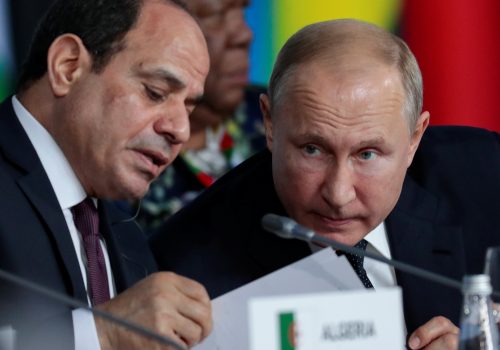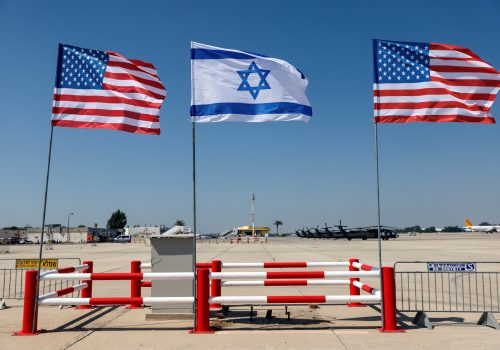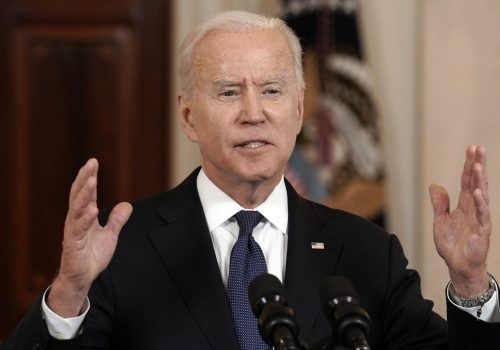Biden’s Middle East trip is sending Iran an escalatory message. Here’s why.
US President Joe Biden’s first Middle East trip since taking office comes amid escalating threats of an Israeli military attack against Iran. The visit takes place after talks to revive the Iran nuclear deal ended in Qatar on June 29 without any progress.
“We will not hesitate to use force to keep our citizens safe,” Israeli Prime Minister Yair Lapid said at an Israeli Defense Forces graduation ceremony on July 8. He cited a nuclear Iran, Hezbollah’s precision-guided missiles in Lebanon, and an axis of terror that is trying to entrench itself in Syria as posing challenging threats to Israel’s security.
A former Israeli national security advisor had warned earlier that Israel must prevent Iran from building bases in Syria at any cost. Israel has regularly carried out airstrikes against Iranian-backed forces in Syria—including the bombing of Damascus airport in early June forcing its closure for several weeks—in a bid to stop weapons shipments to Hezbollah, which has close links with Iran. Israel reportedly coordinated these and earlier airstrikes closely with Washington, according to a report published in the Wall Street Journal.
In early June, Israel conducted military drills in the Mediterranean and Red Sea that were clearly meant to send a message that it isn’t ruling out the military option to stop Iran from obtaining a nuclear bomb.
Meanwhile, US patience with Iran is wearing thin; it appears that Biden’s visit to Israel on July 13 and his subsequent meeting with the Gulf Cooperation Council (GCC) and Arab leaders in Saudi Arabia on July 15-16 may likely be a prelude to an escalation against Iran.
GCC member states—Saudi Arabia, Bahrain, Kuwait, Qatar, Oman, and the United Arab Emirate (UAE)—share Israel’s concerns about Iran’s “sponsorship of terrorism” and its expansionist goals, which they perceive as threats to their security. Several of these Gulf states have sizable Shia minorities and accuse Iran—which is predominantly Shia—of fomenting sectarian tensions in their countries—accusations that aren’t entirely baseless.
The flurry of diplomatic activity in the region ahead of Biden’s Middle East trip, is part of efforts by the GCC and Arab leaders to coordinate stances and forge a unified force against Iran. This included a regional tour by Saudi Crown Prince Mohamed bin Salman (MBS) in late June that took him to Egypt, Jordan, and Turkey; visits by Egyptian President Abdel Fattah el Sisi to Oman and Bahrain on June 27-30 and a recent, little-publicized meeting between Saudi and Israeli officials in Egypt.
Sisi, who has been invited to participate in the upcoming Saudi summit in the port city of Jeddah with Biden, has reaffirmed Egypt’s commitment to Gulf security calling it an extension of Egypt’s national security. He has also expressed his “rejection of any practices that seek to destabilize the Gulf region.” Sisi’s remarks came during the June 21 visit by MBS to Egypt.
There has been talk of a push by the Biden administration for a regional security alliance along the lines of NATO which would include Arab states, Israel and the Gulf to counter the Iranian threat. Israeli Defense Minister Benny Gantz has reportedly hinted at creating a US-led Middle East Air Defense Alliance (MEAD) that would defend member states from hostile missiles and drones. The idea appears to be gaining ground in light of Iran’s intransigence in the Doha talks.
With tensions running high in the region, an escalation against Iran at this time can only exacerbate the situation, further widening the rift between Iran and its adversaries in the region. Perhaps sensing the danger of a looming war, Iran appears to have backtracked on its earlier demand for the easing of US sanctions in return for nuclear concessions: it now insists that a revived nuclear deal with the US is possible.
“We are determined to continue negotiating until a realistic agreement is reached,” Iranian Foreign Minister Hossein Amir-Abdollahian said on July 4 after the Doha talks stalled.
Resorting to military means when there is even the slimmest chance for diplomacy would be a serious blunder and can only plunge the already-troubled region into further conflict. A military campaign against Iran would have grave implications for all involved. The US shouldn’t repeat the past mistake of its 2003 invasion of Iraq which came after a nod of approval from some of its Middle Eastern allies. Not only did the Iraq war cost the US nearly $2 trillion, it also killed at least 134,000 Iraqi civilians. Meanwhile, over 4,200 US military personnel lost their lives in the first 6.5 years of Operation Iraq Freedom and left Iraq marred by terror and conflict.
An all-out military campaign against Iran isn’t the solution as it is unlikely to dissuade Iran from pursuing its nuclear ambitions; if anything, it would escalate tensions further and plunge the already-troubled region into deeper conflict. War or no war, the Islamic Republic will likely continue to be a security challenge to the interests of the US and its regional allies.
Covert military actions are already taking place, according to media reports. Since May, at least seven Iranian officials and scientists have been killed in what are likely targeted assassinations by Israel meant to weaken Iran’s nuclear program. Iran has downplayed the assassinations, accusing Israel of only one of the killings—the May 22 slaying of Colonel Sayyad Khodai, a senior official with the Islamic Revolutionary Guard Corps. Nearly all the Iranians killed in recent months were either linked to Iran’s nuclear facilities or military infrastructure supporting Iran’s proxies.
Attempts by Iran to retaliate for Khodai’s killing have failed—so far. According to now-former Israeli Prime Minister Naftali Bennett, Israel and Turkey have thwarted several attempts by Iran-backed terrorists to attack Israeli tourists visiting Turkey. The suspects were arrested, but Israel has warned its citizens against visiting Turkey for fear of retaliatory attacks by Iran.
As a result of Israel’s covert military actions in Iran, it has compromised the safety and security of its citizens abroad. In war, there are no guarantees for safety and innocent citizens often pay the price.
Additionally, cyber-attacks disrupting critical infrastructure in both countries have become standard.
The European Union (EU) which brokered the indirect talks on Iran’s nuclear deal in Vienna has suggested that there may be another round of negotiations following Biden’s Middle East trip. The US should take the EU up on its offer as a last-ditch effort for a diplomatic solution to the Iran crisis.
Meanwhile, Biden’s trip is likely to achieve some political gains for Israel: uniting US allies in the region against a common enemy which may give the US a window of opportunity to coax GCC states like Saudi Arabia to normalize ties with Israel. While that may take a while to materialize, it would at least present an opportunity for greater regional cooperation. Such a development may in turn, encourage the revival of the stalled Middle East peace process and resumption of negotiations between Israel and the Palestinians.
Equally important is the fact that a unified regional force may serve as a powerful deterrent, stoking Tehran’s fears of an imminent war and prompting it to ease its hardliner position. Any future talks, however, would require Tehran and Washington to make concessions to allow for a breakthrough—in the interests of the region’s people.
Shahira Amin is a nonresident senior fellow at the Atlantic Council’s Scowcroft Middle East Security Initiative and an independent journalist based in Cairo. A former contributor to CNN’s Inside Africa, Amin has been covering the development in post-revolution Egypt for several outlets including Index on Censorship and Al-Monitor. Follow her on Twitter @sherryamin13.
Further reading
Tue, Jun 28, 2022
Egypt is cozying up to Russia. It’s time for the US to step in.
MENASource By Shahira Amin
Egypt has, on several occasions, proved its mettle as a mediator between Israel and the Palestinians. Such support would also ensure Cairo's commitment to continuing the economic and political reforms it has started which are in the interests of both the US and Egypt.
Wed, Jul 13, 2022
Biden is visiting Israel. Travel is squarely on the agenda.
MENASource By
One lesser-known element of Washington’s alliance with Israel will be squarely on US President Joe Biden’s agenda: Israel’s long-running quest to join America’s visa waiver program.
Tue, Jul 12, 2022
Biden’s big chance to build a new coalition in the Middle East
New Atlanticist By Daniel B. Shapiro
A regional coalition is emerging of US partners who face common security threats and share similar social, economic, energy, and climate-related challenges.
Image: U.S. President Joe Biden departs for his first trip as president to the Middle East where he will visit Israel, the occupied West Bank and Saudi Arabia, at Joint Base Andrews, Maryland, U.S., July 12, 2022. REUTERS/Evelyn Hockstein


